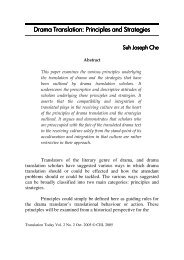Re-Evaluation of Lin Shu (the Chinese Translator) - National ...
Re-Evaluation of Lin Shu (the Chinese Translator) - National ...
Re-Evaluation of Lin Shu (the Chinese Translator) - National ...
Create successful ePaper yourself
Turn your PDF publications into a flip-book with our unique Google optimized e-Paper software.
Xu Jianzhong 159China. Ano<strong>the</strong>r undeniable fact was that <strong>Lin</strong> <strong>Shu</strong> could livecomfortably by translating fictions. Moreover, <strong>Lin</strong> <strong>Shu</strong>’s translatedworks were printed again and again, from which <strong>Lin</strong> <strong>Shu</strong> benefited alot financially.The third element <strong>of</strong> patronage is concerned with <strong>the</strong> statuscomponent. In early modern China, patronage <strong>of</strong> fictional translationwas differentiated. On <strong>the</strong> one hand, prevalent social ideology wascontrolled by capitalist reformists who regarded fiction producers as<strong>the</strong> persons rendering outstanding service to enlightening <strong>the</strong>populace. From this point <strong>of</strong> view, <strong>the</strong> status <strong>of</strong> fiction producersincluding translators was greatly promoted in <strong>Chinese</strong> literaryhistory. On <strong>the</strong> o<strong>the</strong>r hand, <strong>the</strong> income <strong>of</strong> fiction translators wasdependant on private publishers, unlike science translators sponsoredby <strong>the</strong> Qing government. Patrons <strong>of</strong> fictional translation were weakin political and economic power, which led to <strong>the</strong> humble status <strong>of</strong>fiction translators. <strong>Lin</strong> <strong>Shu</strong> was no exception. When <strong>the</strong> version <strong>of</strong>La Dame aux Camelias came out, his true name was not printed on<strong>the</strong> front cover. Instead, it was published in his literary name, LengHong Sheng.Poetics and <strong>Lin</strong> <strong>Shu</strong>’s TranslationLefevere conceives literary system as a subsystem within asociety which is a conglomerate <strong>of</strong> systems. A literary system isgoverned by a dual control mechanism. Besides ideology andpatronage, <strong>the</strong> factors governing <strong>the</strong> literary system from <strong>the</strong> outside,poetics keeps order within <strong>the</strong> literary system (Hermans, 2004: 126).Poetics is “<strong>the</strong> dominant concept <strong>of</strong> what literature should be, or canbe allowed to be, in a given society” (ibid: 127). This part goes on toprobe into <strong>the</strong> influence inflicted by poetics <strong>of</strong> <strong>Chinese</strong> literature on<strong>Lin</strong> <strong>Shu</strong>’s translations from three aspects: <strong>the</strong> language system,narration modes and literary style.
















